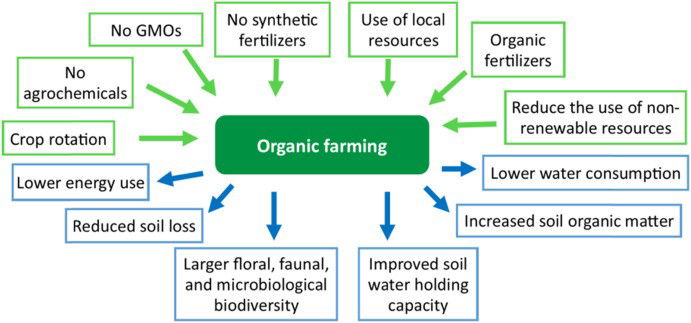Related Blogs
Nurturing Nature: Organic and Natural Farming
The global movement toward sustainable agriculture has brought organic and natural farming to the forefront as essential approaches for the future of agriculture. While both methods emphasise environmental stewardship and the production of chemical-free, nutritious food, they differ significantly in their philosophies and techniques. Organic farming takes a structured, science-based approach. It improves soil health and increases yields while avoiding synthetic chemicals. On the other hand, natural farming is more about letting nature guide the process, aiming to replicate natural ecosystems with minimal human intervention. Despite their differences, both methods provide valuable lessons on how agriculture can evolve to meet our planet’s needs sustainably.
In India, where agriculture is not just a livelihood but a cultural foundation, the need for adopting sustainable farming practices such as organic and natural farming is more urgent than ever. The country is grappling with significant agricultural challenges, including soil degradation, water scarcity, and the impacts of climate change. In this context, these methods offer practical solutions, enhancing soil fertility, conserving water, and promoting biodiversity, leading to a more resilient agricultural system. Additionally, they align with the growing consumer demand for safe, chemical-free food, making them essential for the long-term sustainability of India’s agriculture and food security.
Organic farming is an agricultural approach that relies on natural processes and inputs, avoiding synthetic chemicals altogether. The primary goal is to create a balanced farm ecosystem that produces healthy, nutrient-rich food.
Crop Rotation: Rotation involves planting different crops in succession on the same land. Crop rotation helps break the cycle of pests and diseases, improves soil structure, and reduces the need for chemical fertilisers.
Composting: Organic farming emphasises composting, transforming organic waste into nutrient-rich soil amendments. This process enhances soil fertility, boosts plant growth, and helps sequester carbon, benefiting the environment.
Natural Pest Control: Instead of relying on synthetic pesticides, organic farming uses biological control methods, such as introducing beneficial insects, using natural repellents, and practising crop diversity to manage pests.
Benefits of Organic Farming
Soil Health: Organic farming avoids synthetic chemicals, helping to maintain and improve soil structure and fertility. Healthier soil leads to more nutritious crops and higher yields.
Environmental Impact: Organic practices reduce pollution and conserve water, making them a more environmentally friendly approach to agriculture.
Human Health: Organic products are free from harmful chemicals, providing consumers with healthier and safer food options.

Natural farming, often called “do-nothing” farming, is an agricultural philosophy that minimises human intervention and allows nature to take its course. This method avoids tilling, fertilising, and pest management, instead aiming to replicate natural ecosystems. The underlying belief is that nature when left undisturbed, can maintain a balanced and productive environment. By reducing human interference, natural farming allows the soil to retain its natural structure and fertility, fostering a resilient and sustainable farming system.
ignificant States in India Practicing Natural Farming (Source: NITI Aayog)

diversity: Natural farming promotes biodiversity by encouraging the growth of various crops and plants, which enhances soil health, aids in pest management, and improves climate resilience.
Natural Farming Techniques
Indigenous Cow Breeds: These breeds are well-adapted to local conditions, and their dung is particularly beneficial for soil fertility.
Jeevamrit: This bio-inoculant, made from cow dung, urine, jaggery, and local flours, promotes microbial activity and plant growth.
Mulching: Organic materials used as mulch help retain soil moisture, suppress weeds, and regulate soil temperature.
Benefits of Natural Farming
Soil Regeneration: By allowing natural processes to occur without disturbance, natural farming regenerates soil health over time, leading to healthier, more fertile soil that supports diverse plant life.
Water Conservation: Natural farming practices, such as avoiding tilling and promoting mulching, reduce water evaporation, helping to conserve this essential resource.
Climate Resilience: The emphasis on biodiversity and soil health in natural farming enhances the farm’s resilience to climate change, making it better equipped to withstand extreme weather.
Common Ground Between Organic and Natural Farming Organic and Natural Farming
Organic and natural farming are united by several fundamental principles, underscoring their shared goal of sustainable agriculture:
Soil Health: Both methods prioritise soil health by incorporating organic matter, reducing tillage, and avoiding harmful chemicals. This improves soil structure, water retention, and microbial activity.
Rejection of Synthetic Chemicals: Both approaches avoid synthetic fertilisers, pesticides, and herbicides, which can harm beneficial organisms, pollute water bodies, and leave harmful residues in food. By using natural alternatives, these farming methods prioritise human and environmental health.
Biodiversity: Both methods emphasise the importance of biodiversity in creating resilient and sustainable agricultural systems. They encourage the coexistence of diverse plant and animal life, which aids in natural pest control, pollination, and nutrient cycling.
Sustainability: Organic and natural farming both aim to conserve resources, protect the environment, and ensure the well-being of future generations by working in harmony with nature.
Distinctive Features of Organic and Natural Farming
Despite their shared goals, organic and natural farming have notable differences.

Both organic and natural farming offer numerous benefits, but they also face significant challenges:
Challenges
Yield: Both methods may yield lower yields than conventional farming, especially in the early years, as the soil and ecosystem adjust to the new practices.
Market Access: Organic or natural farming farmers often need help finding markets that value and are willing to pay for sustainably produced food.
Labour Intensity: These methods are often more labour-intensive, requiring careful management and knowledge of ecological processes, which can be a barrier for small-scale farmers.
Opportunities
Global Food Security: Organic and natural farming offer promising solutions to the challenges of feeding a growing population while addressing climate change. These methods enhance soil health, conserve water, and reduce greenhouse gas emissions, contributing to a more resilient and sustainable food system.
Supportive Policies and Consumer Awareness: Government policies and increasing consumer demand for organic and natural products can drive market access and profitability for farmers. Subsidies for organic inputs or incentives for sustainable farming practices can help farmers transition to these methods.
Conclusion
While organic and natural farming offers significant benefits for sustainable agriculture, it’s important to acknowledge that they may only partially meet the needs of the current global population on their own. External inputs like fertilisers or production enhancers may sometimes be necessary to boost yields. However, it’s crucial that these inputs are derived from safe chemicals that do not harm the soil, water, or human health. NICHEM’s agricultural input products align with this approach, prioritising the careful selection and use of chemicals in their offerings. Ultimately, sustainable agriculture should also be able to suffice growing global food need. Thus a holistic and synergistic approach in use of safe chemicals, organic inputs and natural processes will help to create a more resilient and environmentally friendly agricultural system for the future.
About NICHEM
Long-standing Specialty Chemicals player with ISO 9001:2015 certification and a history of providing specialty solutions for over 25 years. The company is headed by senior chemical industry specialists with the combined expertise of more than 100 years. With an emphasis on eco-friendly, non-toxic products, the company’s primary strength is research, development, and customisation. More information on NICHEM can be found at https://nichem.solutions.


